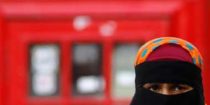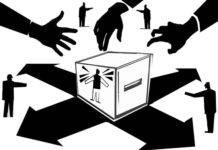Someone needs to bridge this gap
This was at least 15 years ago: An East London theatre was about to stage a drama about conflict in the community, especially the dilemma of Bangladeshi youngsters. Without even knowing what was in the plot, the whole community stood against it.
Somehow, a rumour was spread that Bangladeshi youngsters were involved in drugs, and a lot of abortions were undertaken among Bangladeshi teenage girls. A renowned Bangladeshi playwright wrote the play, and I was among the actors who were cast in it. I personally knew that no such hint about Bangladeshi youth was part of the script.
However, it was about a family where both the parents did not speak English and were suffering from the nostalgia of their Bangladeshi village past. The teenage daughter was in total cultural shock, and she was searching for her identity in many ways, one of which was taking drugs in a shadowy East London alleyway.
It was the mosques of that area which started persuading those who attended Friday prayers to protest, saying that if the drama took place then it would bring shame to the community. And, God forbid, if the mainstream media found out about it, then there would a huge outcry.
The local theatre refused to take the booking for the play, and it never happened.
Tower Hamlets in London underwent many renovation programs and had put an enormous amount of money into a face-lift for the area.
Has anything changed since the drama fiasco?
Some months ago, while two Bangladeshi teenagers and one Somali girl flew to Syria to become “jihadi brides,” I was trying to see the community’s response. Surprisingly, I found the community is still in denial when it comes to opening up to the mainstream media.
Bangladeshi youth should have been immersed in British culture as they were born and schooled there. Sadly, they do not really have a culture as such: They were taught that Islam is their culture, whereas there is a gulf between the culture of Islam and Bengali culture
No one had stood up and said, yes, the issue of religious fundamentalism exists in our community and we are ready to tackle this with the help of others. Rather, the community leaders started throwing dirt at the media and bringing the old race card into play by saying they have been racially harassed, marginalised, and so on. I can recall the UK 2005 election, when Oona King, the then Labour MP, was narrowly defeated by George Galloway who was playing the religious card according to the community’s needs.
Ms King was not allowed to go to the mosque to conduct her campaign, whereas Mr Galloway used to attend prayers every Friday in the local mosques and his followers used to distribute his leaflets. He was even allowed to deliver a speech in the sermons of Friday prayers. I would not be surprised to see the same old religious game being played in the coming elections.
I still see how Bangladeshi youngsters are in the same cultural dynamics and their parents are in the same denial phase as they were 15 years ago.
How come a community has not seen significant changes in a time span of almost two decades, even with the third generation Bangladeshi immigrants in the role of leadership in the community, at least in theory? Then why have they not been able to make any changes in the community?
Bangladeshi youth in London have not had any deep connections with the villages of Bangladesh nor the culture of Bangladesh. Bangladeshi youth should have been immersed in British culture, as they were born and schooled there.
Sadly, they do not really have a culture as such: They were taught that Islam is their culture, whereas there is a gulf between the culture of Islam and Bengali culture.
Are the culture of Saudi Arabia and the culture of Somalia the same? No, they are not, but both countries are Islamic. I strongly believe that problem lies here, in the culture, combining a respective culture with religion.
Bangladeshi culture has a long history of secular influence. Bangladesh fought a bloody war of independence based on this secularism against Pakistani aggression which was carried out in the name of Islam. Thus, in the mainstream Bangladeshi diaspora, the struggle to keep religion apart from the cultural arena is still real.
But in the UK, that is absent on the surface and there are groups who are working hard to establish an Islamic cultural colony. They are from various parts of the Islamic world, but their community in Britain works like a cult or more like underground communist parties.
All the mosque committees in Britain (even in Europe) are dominated by them, and they make sure that their realm is upheld everywhere. A normal boy or girl from a Muslim family is obliged to go to the mosque after school to learn Arabic, and this is mandatory in most cases.
While the kids from other religions enjoy playing outside or participating in after-school activities, the kids from Muslim communities are at the mosque learning a language which they hardly need in their practical lives.
Moreover, they just learn it to read the Holy Qur’an. The mullahs at the mosque make sure that those kids are taught Islamic rules well, rules which are often described as a culture of “ours.”
But the fact remains that these kids belong to the Bangladeshi, Pakistani, or Somali community, and all of these countries have their own strong cultural background. Parents are not keen to teach their kids about their own culture; instead they depend on these mullahs to teach their children about religion and culture.
At the end, these kids come out with their heads full of religious dos and don’ts, and achieve inaccurate perceptions of non-Muslim culture. For such reasons, they cannot resist the call of groups like IS. This folly of the Bengali community is still a taboo and no one dares to talk about it — anyone doing so could be a target, for being anti-religion. If anyone falls into that category by accident then that is the end of his/her life. The community will not only cast them out, but their lives will also be under continuous threat.
So who will take the risk of being the bridge between culture and religion? After all, the universal attitude is to deny the facts and carry on with utmost hypocrisy.
No matter whether you are a person or a community or a state, to survive, you have to put a lid on truth or you are not fit for this millennium.
Masuda Bhatti is a poet and columnist.
Source: Dhaka Tribune











Very familiar situation.You all must have read this,all first generation go through this situation,what I like about the author that her observation about most of our children suffering in the cultural dynamism and parents being in the same denial phase.
Instead of doing surgery to the cancer can we not have all the religious teachers and the mullas go through inter faith training or some sort of education to get them out of the dark ages as that of ‘Joan of Arc’.